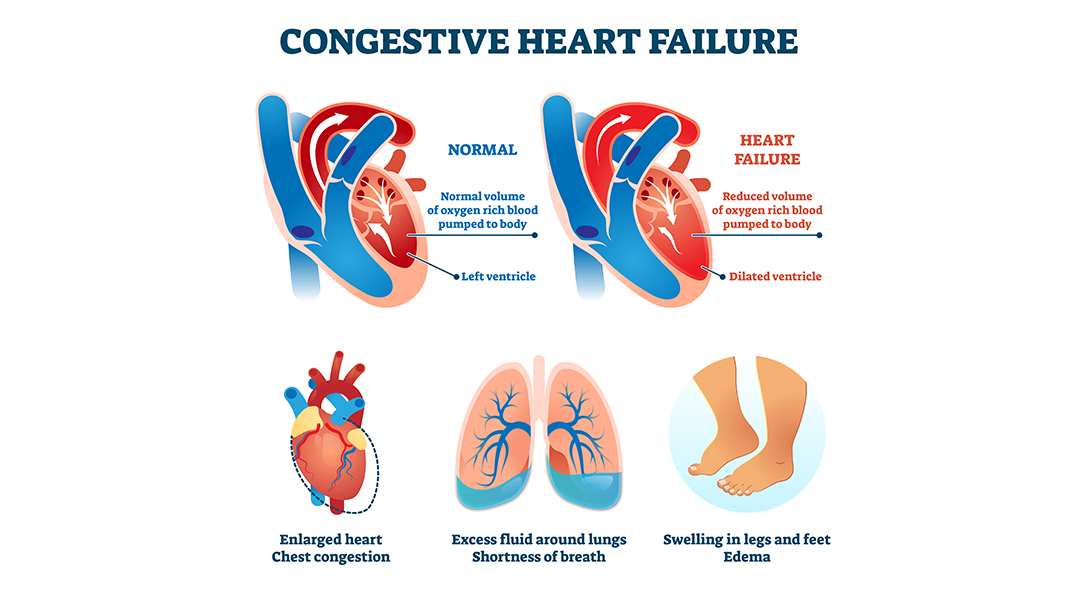Heart failure is a serious condition that can result in organ damage and death (if left untreated). If you want more information about the different types and symptoms of heart failure, take a look at our previous blog posts.
In this article, we’ll explore the different causes of heart failure in greater detail. Let’s get started.
Heart Failure: A Closer Look
Heart failure refers to a condition where the heart is unable to pump blood throughout the body with maximum efficiency. It’s usually the result of progressive weakening, thickening, or stiffening of the heart muscles.
In the past, doctors used to refer to the condition as congestive cardiac failure because it leads to fluid buildup and congestion in the lungs. However, recent research shows that heart failure can cause several other symptoms.
Symptoms of Heart Failure
It’s possible for patients to develop heart failure without showing symptoms for months. That’s because they might attribute signs like confusion and fatigue to other factors, such as old age and stress.
However, if you’re at risk of developing heart failure, you should watch out for the following symptoms:
- Swelling in the abdomen, feet, and legs
- Shortness of breath that worsens due to physical exertion or when lying down
- Weight gain due to fluid buildup
- Loss of appetite
- Pale or bluish skin
Related : Understanding Congestive Heart Failure Symptoms
Causes of Heart Failure
Heart failure can be the result of various underlying conditions, including hypertension, diabetes, chronic respiratory disease, cardiomyopathy, and coronary artery disease. Also, it can be caused by damage to the heart muscles due to a viral or bacterial infection or a previous heart attack.
Moreover, faulty heart valves can strain the cardiac muscles and lead to heart failure. Similarly, heart rhythm disturbances can create structural changes in the left ventricle and cause heart failure.
It’s worth noting that people with a family history of cardiac ailments are more prone to developing heart failure. Also, the risk is higher in seniors and people with an African-American ethnic background. Alcohol consumption, tobacco smoking, and substance abuse also increase the risk.
Types of Heart Failure
Depending on the phase of the heart’s pumping cycle that’s affected by congestive cardiac failure, the condition can be of two types:
- Systolic heart failure – Heart failure due to a problem in the contraction (systolic) phase of the pumping cycle; also known as heart failure with reduced ejection fraction.
- Diastolic heart failure – Heart failure due to a problem in the relaxed (diastolic) phase of the pumping cycle; also known as heart failure with preserved ejection fraction.
Heart failure can also be categorized as:
- Left-sided heart failure (caused by a weak left ventricle)
- Right-sided heart failure (caused by a weak right ventricle)
Related : Types of Heart Failure
Stages of Heart Failure
The American Heart Association (AHA) and the American College of Cardiology (ACC) have identified four distinct stages of heart failure based on the degree of severity. The course of treatment for a patient depends on the stage of heart failure they’re at.
Diagnosing Heart Failure
Heart failure is diagnosed through a series of lab tests, including ECG, echocardiogram, coronary angiography, chest X-ray, brain natriuretic peptide test, etc. Doctors recommend the right combination of tests to identify the causes of heart failure and devise a suitable treatment plan.
Dr. C Raghu is an eminent cardiologist with more than two decades of experience. He specializes in interventional cardiology and has helped a plethora of patients with different heart conditions. If you’ve been diagnosed with heart failure, feel free to consult Dr. Raghu to explore your treatment options.




